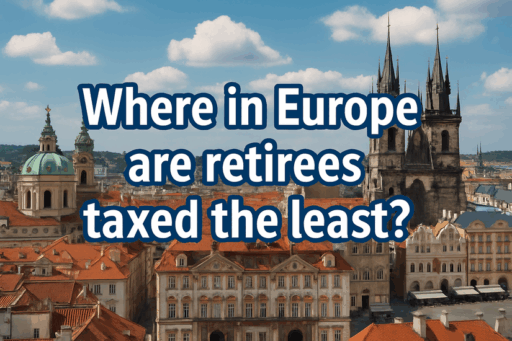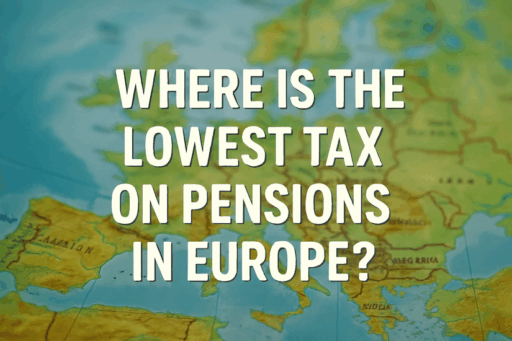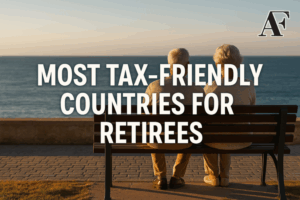Countries like Panama, Portugal, and the Bahamas offer retirees major tax advantages, such as no tax on foreign pensions or investment income, simplified residency, and lower living costs.
Some nations fully exempt foreign-source income, while others provide special expat tax regimes that reduce or delay taxation during retirement.
This post will talk about the best places to retire with low taxes, and how to plan ahead so your money lasts.
If you are looking to invest as an expat or high-net-worth individual, you can email me (hello@adamfayed.com) or WhatsApp (+44-7393-450-837).
This includes if you are looking for a free expat portfolio review service to optimize your investments and identify growth prospects.
Some facts might change from the time of writing. Nothing written here is financial, legal, tax, or any kind of individual advice, nor is it a solicitation to invest or a recommendation of any specific product or service.

What country has the lowest taxes for retirees?
Panama and The Bahamas are the most tax-friendly countries for retirees.
Both exempt foreign-source pensions from tax, offering major savings for expats.
These destinations combine attractive tax policies with reasonable living costs and quality healthcare systems.
Panama
Panama stands out as one of the most tax-friendly retirement destinations globally.
The country imposes no taxes on foreign-source income, including US pensions and Social Security benefits.
This policy allows American retirees to keep their entire pension income while enjoying a tropical lifestyle.
Panama’s Pensionado Visa program provides additional benefits for retirees meeting specific income requirements. The program offers discounts on various services and simplified residency procedures.
Costs for living in Panama start around $1,200 monthly, making it affordable for many retirees.
The Bahamas
The Bahamas represents another excellent tax-free option for international retirees.
Citizens face no obligations regarding income taxes, capital gains taxes, inheritance taxes, or gift taxes. The government funds operations through VAT and stamp taxes instead of direct taxation.
Obtaining Bahamian residency requires a minimum 90-day stay annually and property ownership worth at least $750,000.
While medical services may be limited compared to developed nations, the tax savings often justify these considerations.
The lifestyle remains relatively affordable despite being a popular tourist destination.
Countries where pensions are not taxed for retirees
In addition to Panama and the Bahamas, several high-income countries also offer zero tax on foreign pension income — Monaco, the UAE, and Qatar – but they differ in cost, residency, and regional appeal.
Monaco
Monaco offers complete tax exemption on pension income for qualifying residents.
The principality imposes no personal income tax on individuals, making it attractive for wealthy retirees.
However, residency requirements are strict, and living costs are exceptionally high.
UAE
The United Arab Emirates provides tax-free status for most types of income, including foreign pensions.
The country has developed excellent infrastructure and healthcare systems while maintaining no personal income tax.
Residency visa programs specifically target retirees with adequate financial resources.
Qatar
Qatar similarly exempts foreign pension income from taxation while offering modern amenities and healthcare.
The country provides various residency options for retirees meeting financial criteria.
However, cultural differences and climate conditions require careful consideration.
These tax-free destinations can significantly boost retirement income, but only if you’re eligible and the lifestyle fits your goals.
Where in Europe are retirees taxed the least?

Portugal, Cyprus, and Malta offer some of the most retiree-friendly tax regimes in Europe.
They offer various tax advantages for retirees through special programs and favorable treaty provisions.
These jurisdictions combine cultural richness with practical tax benefits for international retirees.
Portugal
Portugal’s Non-Habitual Resident (NHR) program provides exceptional tax benefits for qualifying retirees.
Foreign-sourced income, including pensions and capital gains, may be completely tax-exempt for specific periods.
Portugal combines these tax advantages with moderate living costs and excellent healthcare systems.
The NHR program requires meeting specific residency requirements and application procedures.
Successful applicants enjoy significant tax savings while accessing Portugal’s pleasant Mediterranean climate.
The country’s infrastructure and cultural offerings make it particularly attractive to European and American retirees.
Cyprus
Cyprus offers competitive personal income tax rates alongside specific exemptions for foreign pensions.
The island nation provides Mediterranean lifestyle benefits with English-speaking populations in many areas.
Healthcare quality is high and living costs remain reasonable compared to Western Europe.
Cyprus’s strategic location provides easy access to both European and Middle Eastern destinations.
The country’s tax treaties with various nations help prevent double taxation issues.
Climate conditions favor year-round outdoor activities and social engagement.
Malta
Malta combines European Union membership benefits with attractive tax advantages through its non-domiciled resident program.
Foreign-sourced income can receive favorable treatment under specific circumstances.
The country offers efficient healthcare systems and rich historical heritage.
Malta’s compact size ensures easy access to all amenities and services.
English serves as an official language alongside Maltese, facilitating communication for international retirees.
The Mediterranean climate supports active outdoor lifestyles throughout the year.
Where is the lowest tax on pensions in Europe?

Greece offers one of the lowest flat tax rates on foreign pension income at 7%. Hungary follows with predictable low rates.
Greece
Greece has introduced special tax incentives specifically targeting international retirees through its Qualified Investor Program (QIP).
Foreign retirees can enjoy substantial tax exemptions on foreign income under this program.
Greece’s relatively low cost of living and stunning landscapes enhance the overall value proposition.
The QIP requires meeting specific investment thresholds and residency requirements
Successful applicants benefit from reduced tax burdens while accessing Greece’s rich cultural heritage.
Healthcare costs remain significantly lower than most Western European countries.
Hungary
Hungary offers a special tax regime allowing foreign-sourced income to be taxed at fixed, predictable rates.
This system provides certainty for retirement financial planning while offering competitive overall tax burdens.
Hungary’s rich history and architecture add cultural value to the retirement experience.
The Hungarian system particularly benefits retirees with diverse income sources from multiple countries.
Double taxation treaties help optimize overall tax efficiency.
Living costs remain among the lowest in the European Union while maintaining good infrastructure.
Pros and Cons of Tax-Friendly Retirement Destinations
Advantages
- Significant reduction in overall tax burden preserves retirement income
- Relatively lower living costs in many tax-friendly countries stretch retirement savings further
- Favorable exchange rates may increase purchasing power for foreign currency holders
Disadvantages
- Many tax-friendly countries require proof of significant income, investment, or property ownership.
- Places like Monaco or The Bahamas offer zero tax, but require significant wealth to gain residency or sustain living costs.
- Not all countries have strong treaties with the retiree’s home country, which can create complexity.
What are the 7 steps in planning your retirement?
These seven fundamental steps provide a comprehensive framework for securing your financial future:
- Maintain excellent health
- Develop meaningful hobbies and activities
- Implement strategic savings plans
- Eliminate all outstanding debts
- Calculate long-term financial requirements
- Diversify income sources
- Estimate retirement expenses accurately
Effective retirement planning requires a systematic approach that addresses multiple financial and lifestyle considerations.
Step 1
Physical and mental health form the foundation of a successful retirement.
Regular healthcare maintenance reduces long-term medical expenses significantly. Preventive care costs far less than treating chronic conditions later in life.
Regular exercise, balanced nutrition, and adequate sleep contribute to longevity.
Step 2
Retirement brings substantial lifestyle changes that require careful preparation.
Developing hobbies and interests before retiring helps maintain mental sharpness and emotional well-being.
Active engagement in meaningful activities prevents depression and cognitive decline among elderly populations.
Consider activities that provide social interaction and intellectual stimulation. Learning new skills or pursuing creative interests keeps the mind engaged.
Step 3
Building substantial retirement savings requires disciplined spending habits and smart financial choices. Small changes in spending patterns can generate significant long-term savings.
Avoiding unnecessary upgrades and luxury purchases accelerates savings accumulation.
The key is distinguishing between wants and needs while making informed financial decisions.
Step 4
Entering retirement debt-free provides tremendous financial freedom and peace of mind.
Outstanding debts reduce available retirement income and create unnecessary stress. Prioritizing debt elimination should begin years before your planned retirement date.
Start by paying off smaller debts first to build momentum and confidence. Avoid accumulating new debts while systematically reducing existing obligations.
Credit card balances, personal loans, and mortgages should be addressed strategically based on interest rates and terms.
Step 5
Retirement expenses typically require approximately 80% of your final pre-retirement salary annually.
This percentage accounts for reduced work-related expenses while maintaining similar lifestyle standards.
However, individual requirements may vary based on health, lifestyle, and geographic location.
Understanding your anticipated expenses helps determine necessary savings targets and investment strategies.
Consider factors like healthcare costs, housing expenses, and desired travel or leisure activities.
Inflation significantly impacts long-term purchasing power and must be factored into calculations.
Step 6
Multiple income streams provide greater financial security and flexibility during retirement.
Social Security, employer pensions, and personal savings form the traditional retirement income foundation.
Additional sources might include rental properties, part-time employment, or investment dividends.
Understanding how different income types are taxed helps optimize overall financial efficiency.
Step 7
Detailed expense planning forms the cornerstone of successful retirement financial management.
Consider both fixed expenses like housing and utilities alongside variable costs like entertainment and travel.
Healthcare expenses typically increase with age and require special attention.
Account for inflation when projecting future expenses over extended retirement periods.
At 3% annual inflation, prices potentially double every 24 years.
At 4% inflation, this doubling occurs in just 18 years, significantly impacting purchasing.
Key Takeaways
- Panama and the Bahamas top the list for zero tax on foreign pensions.
- Portugal’s NHR regime offer tax relief within the EU, attracting many international retirees.
- Some countries, like Monaco or UAE, offer tax-free pensions but come with strict residency or high cost of living requirements.
- Tax-friendly doesn’t mean low-hassle. Visa rules, healthcare access, and cultural fit are critical to long-term satisfaction.
- Professional advice is key, especially for navigating residency, tax treaties, and cross-border estate planning.
- Successful retirement abroad also requires holistic planning around health, income streams, and long-term expenses.
Pained by financial indecision?

Adam is an internationally recognised author on financial matters with over 830million answer views on Quora, a widely sold book on Amazon, and a contributor on Forbes.



